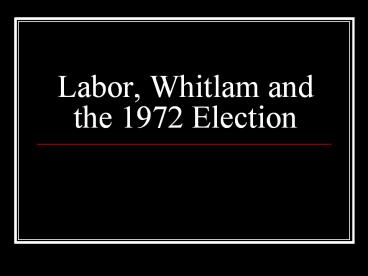Labor, Whitlam and the 1972 Election - PowerPoint PPT Presentation
1 / 11
Title: Labor, Whitlam and the 1972 Election
1
Labor, Whitlam and the 1972 Election
2
Labor, Whitlam, and the 1972 Election
- In 1966, the founder of the Liberal Party Robert
Gordon Menzies retires as PM as a
parliamentarian at the top of his game - He has well and truly left his left his mark on
Australian politics and society
3
Labor, Whitlam, and the 1972 Election
- Along with the leadership vacuum that Menzies
departure created, the Liberal/Country Party
Coalition had to contend with two major issues - A very conservative approach and policy structure
pertaining to economic management - and the Vietnam War
- The Coalition had been in power since 1949 they
were now beginning to struggle with an image that
they were tired and irrelevant in government.
4
Labor, Whitlam, and the 1972 Election
- Liberal dissent
- Harold Holt (66-67) had an egalitarian style of
leadership as opposed to Menzies appeared
youthful - Fought won 66 election on issue of Vietnam
won a resounding victory majority of 40 seats - Disappeared of Cheviot beach 67
5
Labor, Whitlam, and the 1972 Election
- Liberal dissent continues
- Senator John Gorton parachuted into Holts old
seat and elected leader of the party - Unable to compete with Whitlam, particularly in
the medium of television - Whitlam won two by-elections, then an 18-seat
swing in the 69 election (DLP preferences
against Labor cost them Government)
6
Labor, Whitlam, and the 1972 Election
- Liberal dissent continues
- In 1971, the Liberals dumped Gorton in favour of
William McMahon. - McMahon was considered well past his political
prime, and was never able to get the better of
the more charismatic Whitlam. - Whitlams visit and recognition of China drew
criticism from McMahon only to discover Nixon
was working towards same recognition. - Generally weak leadership and a poor political
performer.
7
Labor, Whitlam, and the 1972 Election
- Gough Whitlam
- swiftly made his mark on the ALP - internal
reform to fruition, and overhauling or discarding
a series of Labor policies that had been
enshrined for decades. - Economic rationalism is an Australian term in
discussion of microeconomic policy, applicable to
the economic policy of many governments around
the world, in particular during the 1980s and
1990s.... - The White Australia Policy was dropped
- Labor no longer opposed state aid.
- grim working-class Puritanism of the 1950s gave
way to a younger, more optimistic, more socially
liberal, more intellectual, and decidedly
middle-class party.
8
Labor, Whitlam, and the 1972 Election
- Whitlam concentrated on party reform and new
policy development. - advocated the abolition of conscription
- Australian withdrawal from the Vietnam War
- in 1971 visited the People's Republic of China
(PRC), promising to establish diplomatic
relations - He promised a massive reform agenda incorporating
health, education, and social welfare
9
1972 Election Its Time
- Federal elections were held in Australia on 2
December 1972. All 125 seats in the House of
Representatives were up for election. The Liberal
Party of Australia had been in power since 1949,
and under Prime Minister of Australia William
McMahon since March 1971 with coalition partner
the Country Party... - 1972 saw Whitlam lead the ALP to its first
electoral victory since 1946.
10
(No Transcript)
11
(No Transcript)































